Brian Zinchuk is editor and owner of Pipeline Online
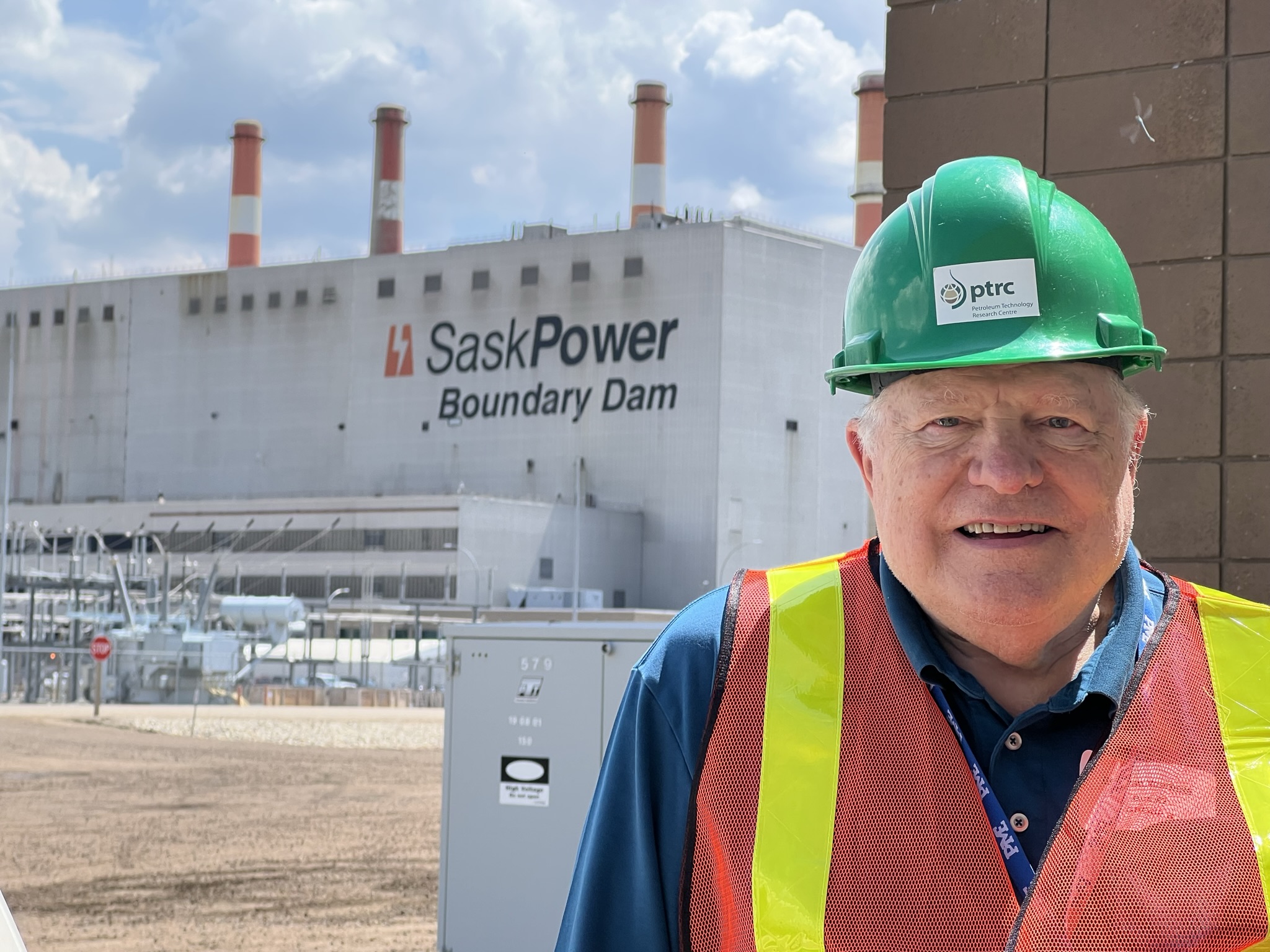
American CCS representative Bob Van Voorhees spoke at length about developments in the field. Photo by Brian Zinchuk
PTRC hosts ISO plenary session on international standards for carbon capture and storage
ESTEVAN – It was a busy week for everyone in the carbon capture industry in Saskatchewan, as the world came to Regina, Estevan and Weyburn to work on international standards around carbon capture, transportation and storage. The week-long event, from June 5-9, was the International Organization of Standards (ISO) Technical Committee 265 Plenary Meeting.
Hosted by the Petroleum Technology Research Centre in conjunction with the International CCS Knowledge Centre, SaskPower and Whitecap Resources, the Saskatchewan session showed off what has already been implemented in this province. That included the Boundary Dam Unit 3 Integrated Carbon Capture and Storage Project, which captures post-combustion carbon dioxide from a coal-fired power unit; Aquistore, a deep saline geologic storage well for CO2; the pipelines used to transport CO2; and the Weyburn Unit, where CO2 from both Boundary Dam and Dakota Gasification are injected underground for enhanced oil recovery and eventual permanent storage.
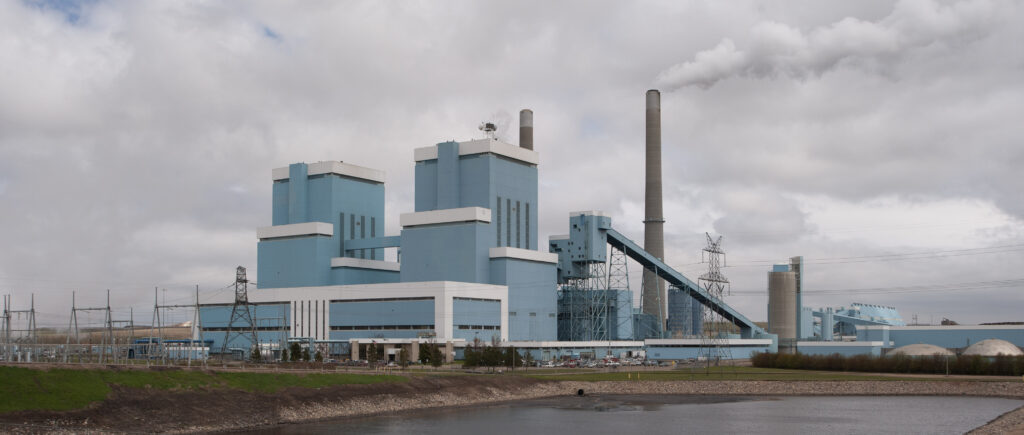
The Antelope Valley Power Station, at Beulah, North Dakota. If the US EPA persists in its carbon capture and storage proposal, this plant, and all others like it, will require CCS installed. Otherwise they will have to shut down. Photo by Brian Zinchuk
EPA proposes universal adoption of CCS in US power production
The long-planned for event occurred just a few weeks after the United States Environmental Protection Agency proposed forcing all American coal-fired power plants implement carbon capture and storage by 2038 or shut down. Similarly, natural gas-fired power plants must either “co-fire” with increasing amounts of hydrogen, implement carbon capture, or also shut down in that time frame. Thus, the commercial implementation of what has been done in Saskatchewan since 2000, the length and breadth of experience in the field has come to centre stage. Indeed, the EPA proposal specifically cited the Boundary Dam project in its justifications.
On Page 56 of 681 in the proposed rule, the EPA states, “There are several examples of the application of CCS at EGUs, some of which are noted here with further detail provided in section VII.F.3.b.iii(A) of this preamble. These include SaskPower’s Boundary Dam Unit 3, a 110-MW lignite-fired unit in Saskatchewan, Canada, which has achieved CO2 capture rates of 90 per cent using an amine-based post-combustion capture system retrofitted to the existing steam generating unit. Amine-based carbon capture has also been demonstrated at AES’s Warrior Run (Cumberland, Maryland) and Shady Point (Panama, Oklahoma) coal-fired power plants.”
- 0113 Miller Epic Cinematic Hollywood trailer0113 Miller Epic Cinematic Hollywood trailer
- 0112 SASPO-2896_Right of Way_Awareness_20250112 SASPO-2896_Right of Way_Awareness_2025
- 0111 2026 SK Oil Show booth promo 010111 2026 SK Oil Show booth promo 01
- 0085 Turnbull snow removal call office0085 Turnbull snow removal call office
- 0110 SaskEnergy SEI_Network_Members_Burn_Brighter0110 SaskEnergy SEI_Network_Members_Burn_Brighter
- 0105 SaskEnergy Commitment to Safety0105 SaskEnergy Commitment to Safety
- 0102 Lori Carr Coal Extended0102 Lori Carr Coal Extended
- 0100 Turnbull Project Manager0100 Turnbull Project Manager
- 0099 Mryglod Steel 1080p0099 Mryglod Steel 1080p
- 0097 Eagle Sky Ventures LTD0097 Eagle Sky Ventures LTD
- 0095 Fast Trucking nearly 70 years good at it0095 Fast Trucking nearly 70 years good at it
- 0092 Turnbull projects big and small0092 Turnbull projects big and small
- 0046 City of Estevan This is Estevan Teaser0046 City of Estevan This is Estevan Teaser
- 0077 Caprice Resources Stand Up For Free Speech0077 Caprice Resources Stand Up For Free Speech
- 0061 SIMSA 2024 For Sask Buy Sask0061 SIMSA 2024 For Sask Buy Sask
- 0051 JML Hiring Pumpjack assembly0051 JML Hiring Pumpjack assembly
- 0049 Scotsburn Dental soft guitar0049 Scotsburn Dental soft guitar
- 0041 DEEP Since 2018 now we are going to build0041 DEEP Since 2018 now we are going to build
- 0032 IWS Summer hiring rock trailer music
- 0022 Grimes winter hiring
- 0021 OSY Rentals S8 Promo
- 0018 IWS Hiring Royal Summer
- 0013 Panther Drilling PO ad 03 top drive rigs
- 0002 gilliss casing services0002 gilliss casing services
- 9002 Pipeline Online 30 sec EBEX9002 Pipeline Online 30 sec EBEX
- 9001
An American perspective
The plenary session attracted representatives from Australia, Brazil, Canada, China, France, Germany, Japan, South Korea, Netherlands, Norway, Singapore, United States and United Kingdom.
That’s according to Bob Van Voorhees, an lawyer from Washington, D.C., with the Carbon Sequestration Council. He spoke to Pipeline Online at length on June 7 during the group’s visit to Boundary Dam Power Station.
He described the council as “a group that started off as a group of petroleum companies and electric utilities in the US. It came together to provide recommendations and input for the development of regulatory frameworks.”
He said the ISO is based in Geneva, Switzerland. “It is an international organization to develop standards for any kind of technology, or anything. So basically, the way it operates is it’ll set up a technical committee to work on a standard in a particular area. In the case of carbon capture and storage, it’s set up a Technical Committee 265 (TC 265), which is carbon dioxide, capture, transportation, and storage.
“And the way they operate, they put up a committee and national standard making organizations will join that committee. So in the US, I’m a representative for the US. It’s the American National Standards Institute, ANSI. And the technical committee, each country that wants to participate will be represented by its national standards organization.”
He said there were 25 participating members and several more observer status nations who can take part, but don’t have a vote.
He noted there is a capture standard in place now for power plants, a transportation standard in place for pipelines, and another for deep geologic storage like Aquistore. But that last standard is being revised as experience has been gained. That process should be done by October, 2024.
- 0113 Miller Epic Cinematic Hollywood trailer0113 Miller Epic Cinematic Hollywood trailer
- 0112 SASPO-2896_Right of Way_Awareness_20250112 SASPO-2896_Right of Way_Awareness_2025
- 0111 2026 SK Oil Show booth promo 010111 2026 SK Oil Show booth promo 01
- 0085 Turnbull snow removal call office0085 Turnbull snow removal call office
- 0110 SaskEnergy SEI_Network_Members_Burn_Brighter0110 SaskEnergy SEI_Network_Members_Burn_Brighter
- 0105 SaskEnergy Commitment to Safety0105 SaskEnergy Commitment to Safety
- 0102 Lori Carr Coal Extended0102 Lori Carr Coal Extended
- 0100 Turnbull Project Manager0100 Turnbull Project Manager
- 0099 Mryglod Steel 1080p0099 Mryglod Steel 1080p
- 0097 Eagle Sky Ventures LTD0097 Eagle Sky Ventures LTD
- 0095 Fast Trucking nearly 70 years good at it0095 Fast Trucking nearly 70 years good at it
- 0092 Turnbull projects big and small0092 Turnbull projects big and small
- 0046 City of Estevan This is Estevan Teaser0046 City of Estevan This is Estevan Teaser
- 0077 Caprice Resources Stand Up For Free Speech0077 Caprice Resources Stand Up For Free Speech
- 0061 SIMSA 2024 For Sask Buy Sask0061 SIMSA 2024 For Sask Buy Sask
- 0051 JML Hiring Pumpjack assembly0051 JML Hiring Pumpjack assembly
- 0049 Scotsburn Dental soft guitar0049 Scotsburn Dental soft guitar
- 0041 DEEP Since 2018 now we are going to build0041 DEEP Since 2018 now we are going to build
- 0032 IWS Summer hiring rock trailer music
- 0022 Grimes winter hiring
- 0021 OSY Rentals S8 Promo
- 0018 IWS Hiring Royal Summer
- 0013 Panther Drilling PO ad 03 top drive rigs
- 0002 gilliss casing services0002 gilliss casing services
- 9002 Pipeline Online 30 sec EBEX9002 Pipeline Online 30 sec EBEX
- 9001
Working groups
Within TC 265 has had seven working groups, like subcommittees. Van Voorhees said, “Workgroup 1 is all about capture technology. So they developed a standard for capturing carbon dioxide from power plants.
“Workgroup 1 is the pipeline word transportation by pipeline work group. And they developed a standard for transporting carbon dioxide by pipeline. Workgroup 3 is geologic storage or geologic sequestration. And that workgroup developed a standard for storing, actually doing the injection wells like the Aquistore. So those would say, ‘Here’s how you need to design those wells. And here’s what you need to do to make sure that is going to be safely stored long term in subsurface geology.’”
Van Voorhees continued, “Workgroup 4 was the quantification and verification workgroup, which actually has discontinued operation. Right now, Workgroup 5 is cross cutting issues. So Workgroup 5, develop the standard for the vocabulary for CCS and was working on a standard for how to do risk assessments for the whole chain of projects. Workgroup 6, which was set up after the others, is the storage in association with enhanced oil recovery. So that’s the Weyburn (Unit). And that develop the standard, which is ISO 27916, which was put out in 2019. And the storage standard is 27914.
- 0113 Miller Epic Cinematic Hollywood trailer0113 Miller Epic Cinematic Hollywood trailer
- 0112 SASPO-2896_Right of Way_Awareness_20250112 SASPO-2896_Right of Way_Awareness_2025
- 0111 2026 SK Oil Show booth promo 010111 2026 SK Oil Show booth promo 01
- 0085 Turnbull snow removal call office0085 Turnbull snow removal call office
- 0110 SaskEnergy SEI_Network_Members_Burn_Brighter0110 SaskEnergy SEI_Network_Members_Burn_Brighter
- 0105 SaskEnergy Commitment to Safety0105 SaskEnergy Commitment to Safety
- 0102 Lori Carr Coal Extended0102 Lori Carr Coal Extended
- 0100 Turnbull Project Manager0100 Turnbull Project Manager
- 0099 Mryglod Steel 1080p0099 Mryglod Steel 1080p
- 0097 Eagle Sky Ventures LTD0097 Eagle Sky Ventures LTD
- 0095 Fast Trucking nearly 70 years good at it0095 Fast Trucking nearly 70 years good at it
- 0092 Turnbull projects big and small0092 Turnbull projects big and small
- 0046 City of Estevan This is Estevan Teaser0046 City of Estevan This is Estevan Teaser
- 0077 Caprice Resources Stand Up For Free Speech0077 Caprice Resources Stand Up For Free Speech
- 0061 SIMSA 2024 For Sask Buy Sask0061 SIMSA 2024 For Sask Buy Sask
- 0051 JML Hiring Pumpjack assembly0051 JML Hiring Pumpjack assembly
- 0049 Scotsburn Dental soft guitar0049 Scotsburn Dental soft guitar
- 0041 DEEP Since 2018 now we are going to build0041 DEEP Since 2018 now we are going to build
- 0032 IWS Summer hiring rock trailer music
- 0022 Grimes winter hiring
- 0021 OSY Rentals S8 Promo
- 0018 IWS Hiring Royal Summer
- 0013 Panther Drilling PO ad 03 top drive rigs
- 0002 gilliss casing services0002 gilliss casing services
- 9002 Pipeline Online 30 sec EBEX9002 Pipeline Online 30 sec EBEX
- 9001
45Q impact on Weyburn and Midale
“But 27916 is interesting, because it has been adopted by the Internal Revenue Service in the US as a basis for doing what the US calls 45Q credits. So there are tax credits available in the US for storing CO2, either in saline formations or through enhanced oil recovery.”
All of this could have profound implications for oil production from the Weyburn and Midale Units, operated by Whitecap Resources and Cardinal Energy.
The 45Q tax credits will have a significant impact on the Weyburn and Midale carbon sequestration programs, as they source carbon dioxide from the Dakota Gasification plant at Beulah, North Dakota. Initially, 45Q provided a US$50 tax credit for each tonne of CO2 injected directly into geologic storage, like the Aquistore project, but US$30 per tonne for CO2 used for enhanced oil recovery. While Encana/Cenovus then Whitecap never publicly disclosed what they pay for CO2 from Dakota Gasification, several sources have told Pipeline Online over the years the number is not far off from US$30 a tonne.
That supply contract is done in 2024, and 45Q will have a tremendous impact on its renegotiation and continuation, or possible discontinuation. That’s because updates to 45Q in the 2022 Inflation Reduction Act raised those tax credits to US$85 per tonne of CO2 for CO2 injected into geologic storage, and US$60 per tonne for CO2 used in enhanced oil recovery.
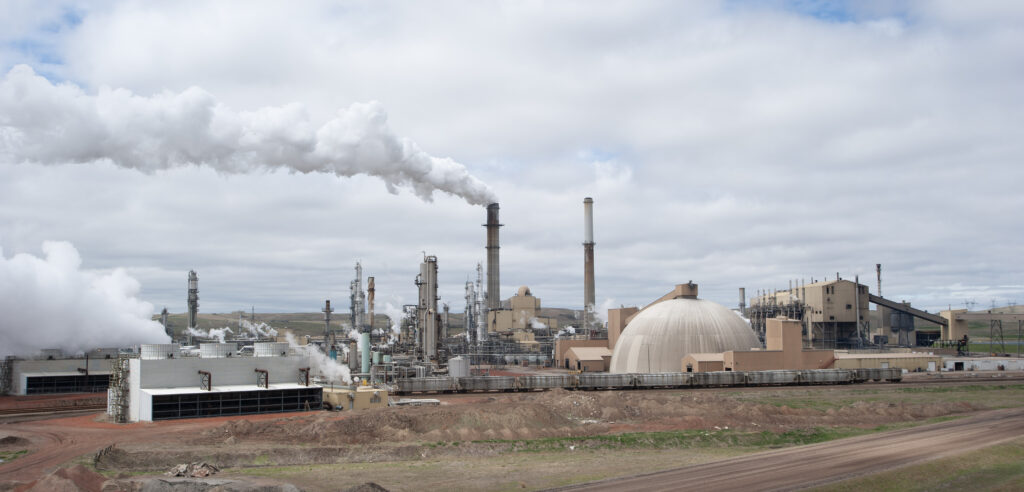
Dakota Gasification’s Great Plains Synfuels Plant at Beulah, North Dakota. Photo by Brian Zinchuk
That effectively puts a floor on the price Whitecap will have to pay for carbon dioxide from the U.S. If Dakota Gasification chose to drill an injection well(s) like Aquistore right next to the Great Plains Synfuels plant, source of the CO2, and pump that CO2 into the ground there, they could recoup a US$85 per tonne tax credit. So Whitecap and Cardinal Energy will likely have to up their game, substantially, or risk losing their primary source of CO2 (for Cardinal, their only source.)
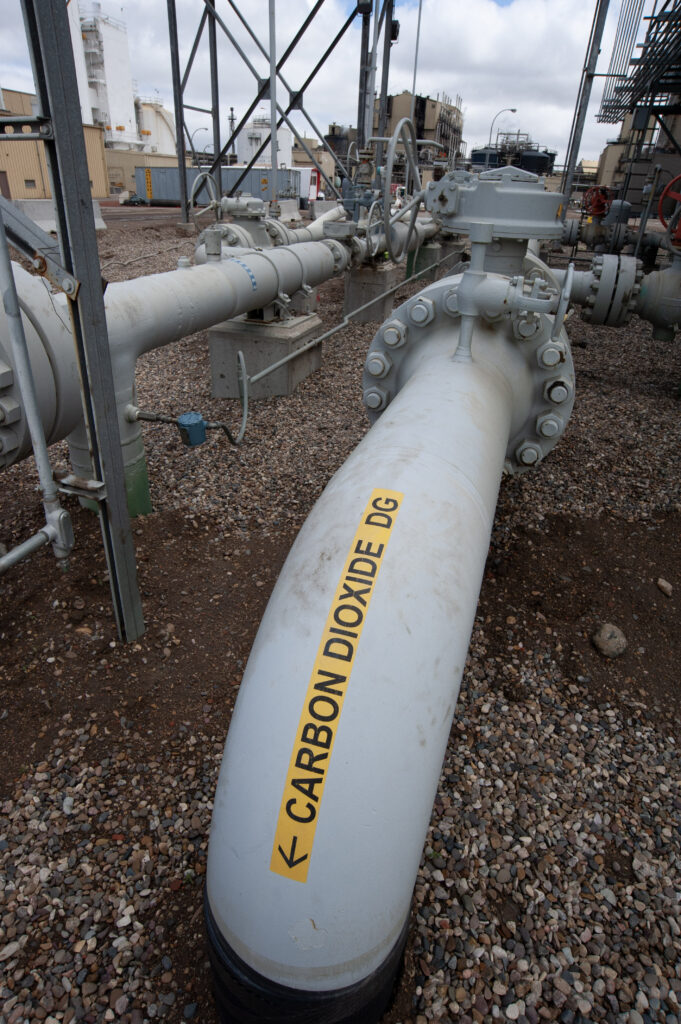
The other end of the pipeline: This is the origin of the Souris Valley Pipeline, which carries carbon dioxide from the Dakota Gasification plant at Beulah, North Dakota. Photo by Brian Zinchuk
And if Canadian federal regulations successfully shut down all coal operations here by 2030, then Whitecap could also lose its Boundary Dam source of CO2 as well. Recently Canada’s Minister of Environment and Climate Change Steven Guilbeault threatened possible jail time for those in Saskatchewan responsible if coal usage continued beyond 2030, to which Premier Scott Moe replied, “Come get me.”
- 0113 Miller Epic Cinematic Hollywood trailer0113 Miller Epic Cinematic Hollywood trailer
- 0112 SASPO-2896_Right of Way_Awareness_20250112 SASPO-2896_Right of Way_Awareness_2025
- 0111 2026 SK Oil Show booth promo 010111 2026 SK Oil Show booth promo 01
- 0085 Turnbull snow removal call office0085 Turnbull snow removal call office
- 0110 SaskEnergy SEI_Network_Members_Burn_Brighter0110 SaskEnergy SEI_Network_Members_Burn_Brighter
- 0105 SaskEnergy Commitment to Safety0105 SaskEnergy Commitment to Safety
- 0102 Lori Carr Coal Extended0102 Lori Carr Coal Extended
- 0100 Turnbull Project Manager0100 Turnbull Project Manager
- 0099 Mryglod Steel 1080p0099 Mryglod Steel 1080p
- 0097 Eagle Sky Ventures LTD0097 Eagle Sky Ventures LTD
- 0095 Fast Trucking nearly 70 years good at it0095 Fast Trucking nearly 70 years good at it
- 0092 Turnbull projects big and small0092 Turnbull projects big and small
- 0046 City of Estevan This is Estevan Teaser0046 City of Estevan This is Estevan Teaser
- 0077 Caprice Resources Stand Up For Free Speech0077 Caprice Resources Stand Up For Free Speech
- 0061 SIMSA 2024 For Sask Buy Sask0061 SIMSA 2024 For Sask Buy Sask
- 0051 JML Hiring Pumpjack assembly0051 JML Hiring Pumpjack assembly
- 0049 Scotsburn Dental soft guitar0049 Scotsburn Dental soft guitar
- 0041 DEEP Since 2018 now we are going to build0041 DEEP Since 2018 now we are going to build
- 0032 IWS Summer hiring rock trailer music
- 0022 Grimes winter hiring
- 0021 OSY Rentals S8 Promo
- 0018 IWS Hiring Royal Summer
- 0013 Panther Drilling PO ad 03 top drive rigs
- 0002 gilliss casing services0002 gilliss casing services
- 9002 Pipeline Online 30 sec EBEX9002 Pipeline Online 30 sec EBEX
- 9001
What is CO2 worth, and to whom?
As for Dakota Gasification, Van Voorhees said, “I don’t know all the economics, but you’re right, they’ll have other options, whether they decide they’re going to want to store it themselves instead of selling it for EOR.”
“There are lots of people trying to figure out all different angles to how to maximize economic value of the CO2.”
In Saskatchewan’s experience, there’s been something of a tug of war when it comes to paying for the carbon dioxide, going back to the decision whether or not to build the BD3 project. The oil companies, who can implement it for enhanced oil recovery to increase production and lengthen the lives of declining fields, historically have wondered why they should pay for something that, for the power utility, is a waste product. After all, they’re disposing of it. But from the power utility perspective, the oil company can definitely put that product, CO2, to use to improve their production and profits. This conundrum was obviously solved through negotiation, and then-Cenovus signed a 10 year deal which will expire in 2024, paying an undisclosed price for the CO2. But they are, indeed, paying for it. But the penalties of an ever-increasing carbon tax, now well above what that agreed price was, further complicates things.
Van Voorhees noted CO2 is a commodity that has value because it can be used. And there have been similar debates south of the border. “Part of the policy efforts behind tax credits and other things like that is basically to encourage people to be able to make the expenditures to store it.
“Yeah, when you think about it, it’s a waste. And it’s being it was being emitted to the air because that was the cheapest thing to do with it. And if somebody says, ‘Well, you, you know, we want you to capture it and put it in the ground that’s like, who’s gonna pay for that?’
“And early on there were utilities in the US who wanted to switch out wanted to do this, do like what Sask is doing. But when they went to their public utility commissions in various states and said, ‘Hey, we want to put this into the rate, build this into the rate base, so that the consumers of the electricity will pay the cost of capturing the carbon dioxide and storing it,’ the public utility said, ‘Wait a minute, you’re not required to do that. So we’re not going to make the ratepayers pay for that.’
“So the only money that was available was funding from the Department of Energy to do research projects or pilot projects, development projects, that sort of thing. It couldn’t get public utility commissions, who are charged with protecting the consumers. to make the consumers pay for the cost of doing it.”
Notably, there is no national carbon tax in the United States.
- 0113 Miller Epic Cinematic Hollywood trailer0113 Miller Epic Cinematic Hollywood trailer
- 0112 SASPO-2896_Right of Way_Awareness_20250112 SASPO-2896_Right of Way_Awareness_2025
- 0111 2026 SK Oil Show booth promo 010111 2026 SK Oil Show booth promo 01
- 0085 Turnbull snow removal call office0085 Turnbull snow removal call office
- 0110 SaskEnergy SEI_Network_Members_Burn_Brighter0110 SaskEnergy SEI_Network_Members_Burn_Brighter
- 0105 SaskEnergy Commitment to Safety0105 SaskEnergy Commitment to Safety
- 0102 Lori Carr Coal Extended0102 Lori Carr Coal Extended
- 0100 Turnbull Project Manager0100 Turnbull Project Manager
- 0099 Mryglod Steel 1080p0099 Mryglod Steel 1080p
- 0097 Eagle Sky Ventures LTD0097 Eagle Sky Ventures LTD
- 0095 Fast Trucking nearly 70 years good at it0095 Fast Trucking nearly 70 years good at it
- 0092 Turnbull projects big and small0092 Turnbull projects big and small
- 0046 City of Estevan This is Estevan Teaser0046 City of Estevan This is Estevan Teaser
- 0077 Caprice Resources Stand Up For Free Speech0077 Caprice Resources Stand Up For Free Speech
- 0061 SIMSA 2024 For Sask Buy Sask0061 SIMSA 2024 For Sask Buy Sask
- 0051 JML Hiring Pumpjack assembly0051 JML Hiring Pumpjack assembly
- 0049 Scotsburn Dental soft guitar0049 Scotsburn Dental soft guitar
- 0041 DEEP Since 2018 now we are going to build0041 DEEP Since 2018 now we are going to build
- 0032 IWS Summer hiring rock trailer music
- 0022 Grimes winter hiring
- 0021 OSY Rentals S8 Promo
- 0018 IWS Hiring Royal Summer
- 0013 Panther Drilling PO ad 03 top drive rigs
- 0002 gilliss casing services0002 gilliss casing services
- 9002 Pipeline Online 30 sec EBEX9002 Pipeline Online 30 sec EBEX
- 9001
Decades of Saskatchewan experience
Asked how significant the 23 years experience of CO2 storage at the Weyburn Unit, 18 years at Midale Unit, and 8 years at Aquistore are to ISO in setting standards, Van Voorhees replied, “It’s very significant, in the sense that the people who have been involved with that can provide input to the process. Because the way these work groups that I talked about, the people that serve on the workgroups are individual subject matter experts, SMEs. So the Oversight Committee has countries, as a member. When you get down to trying to approving a final standard, each participating country gets one vote, whether or not to approve the standard.
“For the individual workgroups, the experts are there as individuals. They’re not there as representatives of their country, or representatives of their company. They’re there because they have expertise, and they’re bringing their expertise to the process. And the process is to bring the experts together and develop by consensus, what the standards ought to be. What do you have to do this safely inject and store carbon dioxide for geologic time, in a permanent way, basically,
“So if I’ve got experience working at Aquistore, then I can come to that group and say, ‘Yeah, here’s what we did,’ and somebody says, ‘Well, you should have to do this in order to meet the standards.’ They said, ‘We tried that that doesn’t work.’ Then they can say, ‘No, that’s not (going to work), here’s what you need to do.’
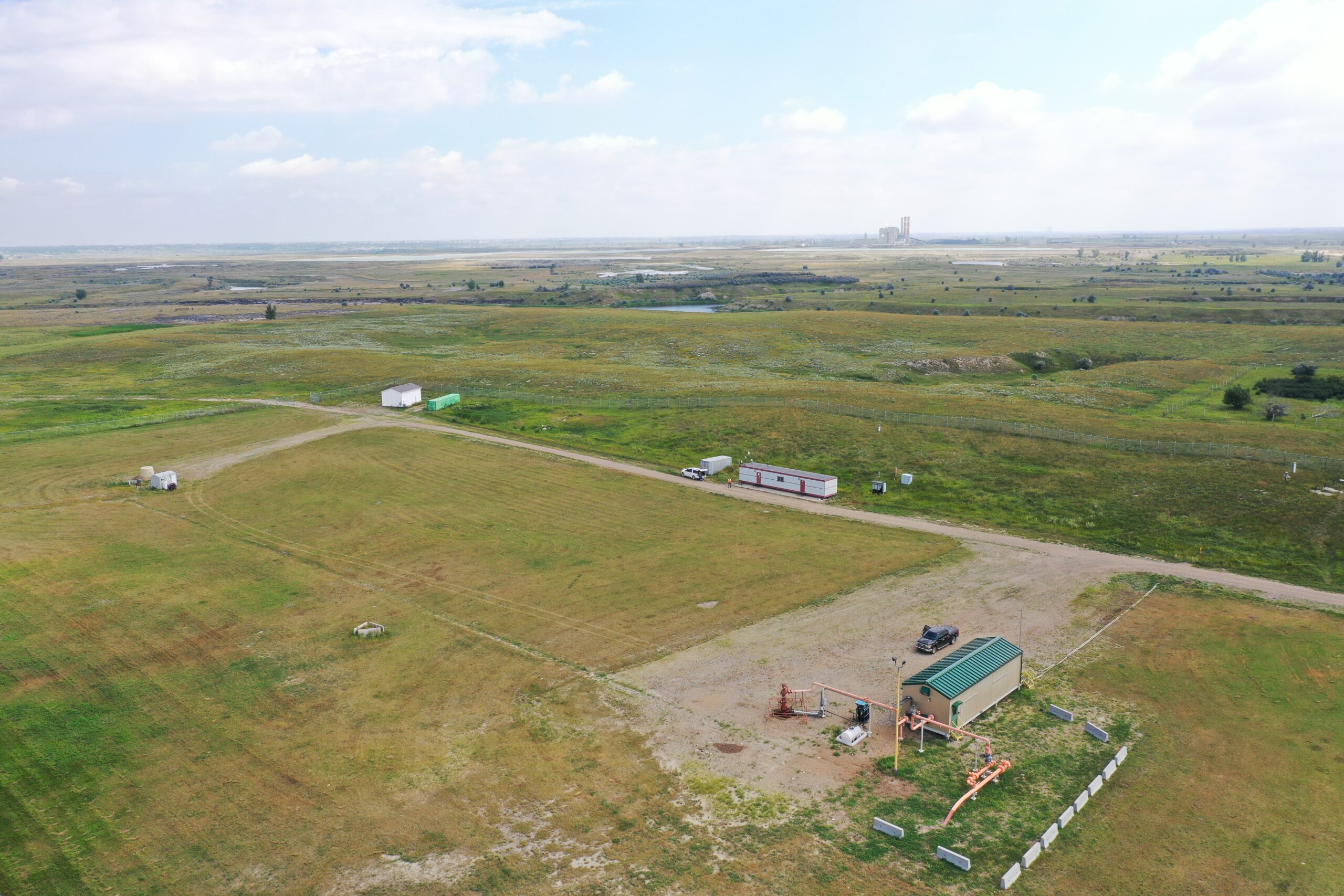
On the right is the Aquistore injection well. On the left is the observation well. On the horizon is the Boundary Dam Power Station, 3 kilometres to the east. Photo by Brian Zinchukj
“And the idea is aimed to have best practices. And basically, what do we know as experts? So the people that are participating in these workgroups will come from scientific research backgrounds, there’ll be university experts. There are a lot of people. The whole idea of drilling wells and building wells, and underground injection, most of experience is in the oil and gas industry. So there are a lot of members of these groups that have their experience from an oil and gas operation. So you’ll have geologists, you will have petroleum engineers, you’ll have people that have run EOR operations in the US or Canada and other places that have a lot of experience with how you do that. Because when it gets down to saying, ‘Okay, how do you store carbon dioxide as part of an AOR operation?’ Then you need to understand how to work in the or field. Because the differences now you’re saying, Yeah, you don’t want any of that CO2 to get it to escape.”
Van Voorhees said the fact Saskatchewan can bring that experience to all this is a significant thing. “The people that are here today are very interested in going to this, because, for some of them, they’ve been theorizing about this, but they don’t actually get to see what is actually doing. There aren’t that many projects like Boundary Dam. I’ve been through capture facilities before because there was a project in West Virginia, the Mountaineer Project, but that was a small-scale project. So they were capturing the CO2 as it’s being done here. And they were injecting it under the ground, but they did it for a couple of years. and then they shut down. The same thing at the Southern Company Plant Barry in Mississippi, and also did it they, you know, produced the captured CO2 and injected it underground for a number of years, and then it stopped.”
Those two projects have since been dismantled, he noted. SaskPower built a similar slipstream carbon capture test facility at Shand Power Station, but after several years in operation, it is now sitting idle.
- 0113 Miller Epic Cinematic Hollywood trailer0113 Miller Epic Cinematic Hollywood trailer
- 0112 SASPO-2896_Right of Way_Awareness_20250112 SASPO-2896_Right of Way_Awareness_2025
- 0111 2026 SK Oil Show booth promo 010111 2026 SK Oil Show booth promo 01
- 0085 Turnbull snow removal call office0085 Turnbull snow removal call office
- 0110 SaskEnergy SEI_Network_Members_Burn_Brighter0110 SaskEnergy SEI_Network_Members_Burn_Brighter
- 0105 SaskEnergy Commitment to Safety0105 SaskEnergy Commitment to Safety
- 0102 Lori Carr Coal Extended0102 Lori Carr Coal Extended
- 0100 Turnbull Project Manager0100 Turnbull Project Manager
- 0099 Mryglod Steel 1080p0099 Mryglod Steel 1080p
- 0097 Eagle Sky Ventures LTD0097 Eagle Sky Ventures LTD
- 0095 Fast Trucking nearly 70 years good at it0095 Fast Trucking nearly 70 years good at it
- 0092 Turnbull projects big and small0092 Turnbull projects big and small
- 0046 City of Estevan This is Estevan Teaser0046 City of Estevan This is Estevan Teaser
- 0077 Caprice Resources Stand Up For Free Speech0077 Caprice Resources Stand Up For Free Speech
- 0061 SIMSA 2024 For Sask Buy Sask0061 SIMSA 2024 For Sask Buy Sask
- 0051 JML Hiring Pumpjack assembly0051 JML Hiring Pumpjack assembly
- 0049 Scotsburn Dental soft guitar0049 Scotsburn Dental soft guitar
- 0041 DEEP Since 2018 now we are going to build0041 DEEP Since 2018 now we are going to build
- 0032 IWS Summer hiring rock trailer music
- 0022 Grimes winter hiring
- 0021 OSY Rentals S8 Promo
- 0018 IWS Hiring Royal Summer
- 0013 Panther Drilling PO ad 03 top drive rigs
- 0002 gilliss casing services0002 gilliss casing services
- 9002 Pipeline Online 30 sec EBEX9002 Pipeline Online 30 sec EBEX
- 9001
EPA proposal
As for the US EPA proposal to dramatically apply carbon capture across power production in the US, Van Voorhees said, “It means it’s going to become a lot more important to be able to implement that technology and put those plans in place. So the combination of that requirement, if it’s finalized, and in conjunction with the tax incentives and other things will make it more viable. So if you want to continue operating that plant into the future, in accordance with those terms, then you’re going to have to put in that technology. Make a choice.”
The EPA proposal, in its justification for applying CCS across the American power fleet, noted that Boundary Dam Unit 3 had been capturing 90 per cent of the CO2. That, however, is an error, as the capture unit has never hit that on annual basis. The best performance seen so far has been 85.7 per cent of the initially promised 1 million tonnes that were supposed to be captured each year. And that million isn’t 100 per cent of the CO2 produced, either.
To that end, Van Voorhees expects the EPA proposal will be revised. “There are people that have been intimately involved in this who will say, ‘Wait a minute, you know, it’s don’t go farther than you can, you know, recognize what’s currently able to be done. And don’t tell people, ‘Okay, in five years, you’ve got to meet this standard when nobody has been able to do it yet.’ So, give people the time to be able to do it, or back off a little bit on what the percentage requirement is. So it’ll be pointed out. People will go in, even people that are working hard to develop that, are going to be concerned about being required to do what’s beyond the current capabilities.”
Could this push towards carbon capture in the US, be thrown out the window if there is a change in administration? Van Voorhees replied, “I would say at this point, it’s unlikely that there’s going to be an administration that says we’re not going to support carbon capture and storage anymore.”
He noted there has been increasing support for CCS from the US Department of Energy going back to 2000. “Funding for that has been consistently supported by each administration by Republican administrations, Democratic administrations. So that funding has continued to be there.
“There will be changes, but I don’t think you’re going to see any administration come in and say, ‘Forget, we’re not doing carbon capture and storage anymore.’ It’s just not part of the plan. The question is, the regulations developed by EPA, yes, a new administration may decide they want to want to tweak those regulations. That’s always open to adjustment.’
- 0113 Miller Epic Cinematic Hollywood trailer0113 Miller Epic Cinematic Hollywood trailer
- 0112 SASPO-2896_Right of Way_Awareness_20250112 SASPO-2896_Right of Way_Awareness_2025
- 0111 2026 SK Oil Show booth promo 010111 2026 SK Oil Show booth promo 01
- 0085 Turnbull snow removal call office0085 Turnbull snow removal call office
- 0110 SaskEnergy SEI_Network_Members_Burn_Brighter0110 SaskEnergy SEI_Network_Members_Burn_Brighter
- 0105 SaskEnergy Commitment to Safety0105 SaskEnergy Commitment to Safety
- 0102 Lori Carr Coal Extended0102 Lori Carr Coal Extended
- 0100 Turnbull Project Manager0100 Turnbull Project Manager
- 0099 Mryglod Steel 1080p0099 Mryglod Steel 1080p
- 0097 Eagle Sky Ventures LTD0097 Eagle Sky Ventures LTD
- 0095 Fast Trucking nearly 70 years good at it0095 Fast Trucking nearly 70 years good at it
- 0092 Turnbull projects big and small0092 Turnbull projects big and small
- 0046 City of Estevan This is Estevan Teaser0046 City of Estevan This is Estevan Teaser
- 0077 Caprice Resources Stand Up For Free Speech0077 Caprice Resources Stand Up For Free Speech
- 0061 SIMSA 2024 For Sask Buy Sask0061 SIMSA 2024 For Sask Buy Sask
- 0051 JML Hiring Pumpjack assembly0051 JML Hiring Pumpjack assembly
- 0049 Scotsburn Dental soft guitar0049 Scotsburn Dental soft guitar
- 0041 DEEP Since 2018 now we are going to build0041 DEEP Since 2018 now we are going to build
- 0032 IWS Summer hiring rock trailer music
- 0022 Grimes winter hiring
- 0021 OSY Rentals S8 Promo
- 0018 IWS Hiring Royal Summer
- 0013 Panther Drilling PO ad 03 top drive rigs
- 0002 gilliss casing services0002 gilliss casing services
- 9002 Pipeline Online 30 sec EBEX9002 Pipeline Online 30 sec EBEX
- 9001
Nine years after SaskPower pioneered carbon capture on coal, the US intends on adopting it wholesale
